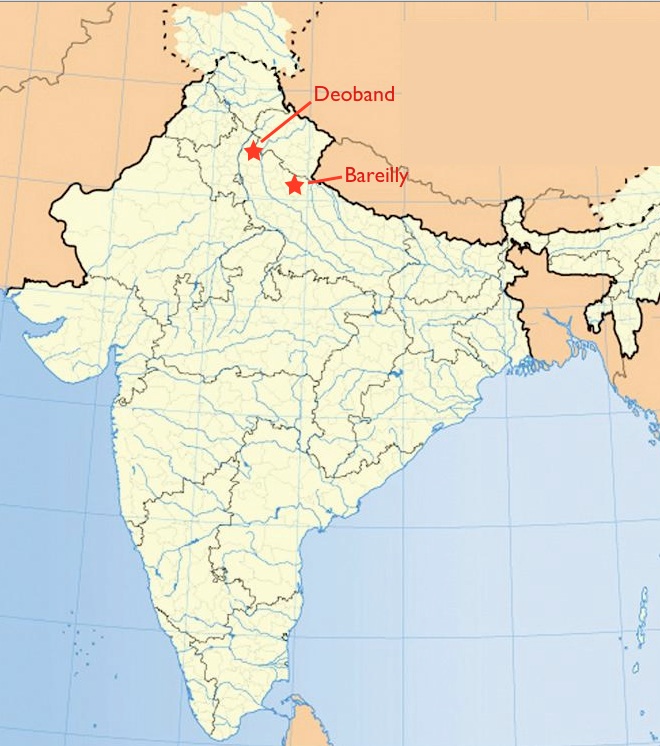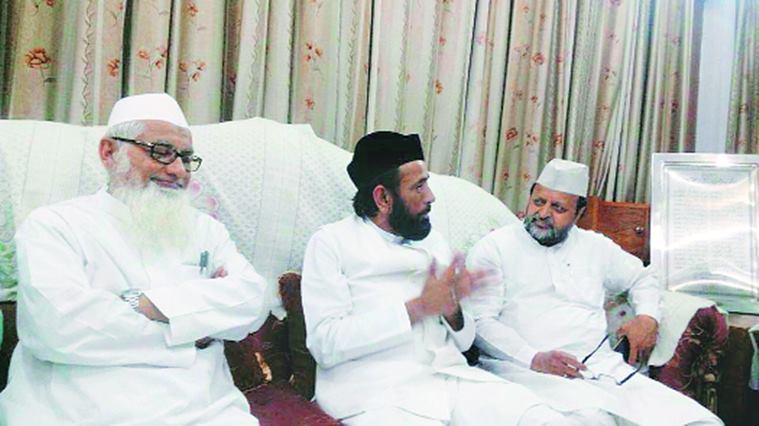7 Easy Facts About Barelvi Described
Wiki Article
Barelvi Fundamentals Explained
Table of ContentsThings about BarelviThe Single Strategy To Use For BarelviThe Definitive Guide for BarelviThe 3-Minute Rule for Barelvi
Radical Islamist teams in South Asia such as the Taliban are typically categorized as Wahhabis, coming from the austere, puritanical kind of Islam institutionalized in Saudi Arabia. But while the connections in between the Wahhabis as well as the Taliban are tight, the last actually belong to a various branch of the confidence.Sunni Islam is divided right into 4 orthodox schools of regulation (Madhhabs), each of which is followed in unique parts of the Muslim world. A number of ceremonies and prayer forms additionally vary among the institutions. As the map above suggests, Wahhabism, based in Saudi Arabia, is connected with Hanbali legislation, the strictest form of Islamic law.

" Sunni Muslims," Haqqani composes, have discarded their hostility to Wahhabi groups, developing a a great deal of conventional Sunnis that welcome Wahhabi political and also jihadi ideas without necessarily providing up their rites and rituals." As is typically kept in mind, Saudi Arabian spiritual funding has actually assisted damage down the barriers between both sects.
Some Known Facts About Barelvi.
Mapping the four conventional institutions of Sunni Islamic regulation is reasonably very easy, although the writers of the Wikipdia map uploaded over are entitled to commendation for doing a particularly good job. But the differences that really matter are not those of Madhhab, yet instead are discovered among much less formal as well as far more recent "activities" within Islamic thought and method.The Deobandi motion is lined up with Wahhabism and also developments a similarly rough, puritanical analysis of Islam. The Barelvi activity, in contrast, safeguards a much more conventional South Oriental variation of the faith centered on the practices of Sufi necromancy. In India and particularly Pakistan, tensions between the two teams can be extreme, sometimes verging on open warfare.
As lately reported in the, "When the Taliban took over Buner in April 2009, they initially besieged Pir Baba's shrine. Taliban leader Fateh Khan said it was because the place was a center of 'adultery and idolatry.'" Because of this, lots of Sufi shrines are now greatly guarded by Pakistani safety forces.
One can, however, conveniently show their location of beginning, as both movements are called for communities in north India: Deoband and also Bareilli. Although extreme Deobandi groups are most very closely associated with Pakistan and also Afghanistan, the movement's intellectual and also spiritual heart is still the Indian city of Deoband. Its Darul Uloom Deoband is deemed to be the second biggest madrasah (spiritual college) in the Sunni Muslim globe, following just Al-Ahzar in Cairo.
Barelvi Fundamentals Explained
Strong numbers are difficult to discover, many professionals preserve that Barelvis dramatically out-number Deobandis not just among Indian Muslims however in Pakistan. In Pakistan, nevertheless, Deobandis have actually been progressing of late, as well as Barelvis pulling back. According to one estimate, "some 15 per cent of Pakistan's Sunni Muslims would this hyperlink certainly consider themselves Deobandi, and also some 60 percent remain in the Barelvi custom.Early Deobandi leaders were distressed by the accomplishment of British manifest destiny and also English-language education and learning, which they looked for to fight by purifying their religious beliefs, removing mystical methods as well as other developments that they deemed as opposed to the confidence (Barelvi). The most hardline Deobandis pertained to relate to Barelvis, as well as Shiites, as non-Muslim challengers deserving of assault.
Deobandi thinking is too typical to be patriotic, relating to the area of the faithful, not the modern nation-state, as the appropriate Quranic political lorry. Most Deobandi scholars declined the partition of British India in 1947, favoring to look for the spread of Islam in a concentrated India. The idea of Pakistan, in addition, was originally embraced by Muslim groups abhored by the hardline Deobandis (Barelvi).
Gradually, nonetheless, received Sunni Islam pertained to dominate Pakistan. President Muhammad Zia-ul-Haq (1978-1988) strove to turn Pakistan right into a fundamentalist Sunni state, formally proclaiming the heterodox Ahmadis to be non-Muslims. Because of this, the Pakistani government progressively drifted in the direction of the severe Deobandi motion. The link, however, is a two-edged sword for contemporary Pakistan, as the Deobandi faithful inevitably more helpful hints have contempt for nationwide identities and borders.
Barelvi Fundamentals Explained
Movie critics link it to terrorist organizations; the Taliban, nevertheless, uprised of Deobandi madrasahs in northeastern Pakistan, as did numerous various other violence-prone companies. Shocking fatwas (religious judgments) do not help its track record. In May 2010, a decree that females can not help incomes stunned mainstream Muslim point of view worldwide. (The described it as a "Talibanesque fatwa that reeked of tribal patriarchy.") A lot more humiliating was the 2006 "fatwas for money" bribery detraction, which was exposed by an Indian tv sting operation.

As Abedin writes: On the concern of so-called Wahabism I put it to Madrassi that numerous doubters of the Deoband seminary claim that Deobandi ideas are just a small step away from full-blown Wahabism. In action the replacement Vice Chancellor makes a clear demarcation between the two institutions of thought, before adding that if we think about the Wahabis and the Barelvis as 2 extremes, the Deobandis click for info occupy the centre ground because continuum.
Report this wiki page